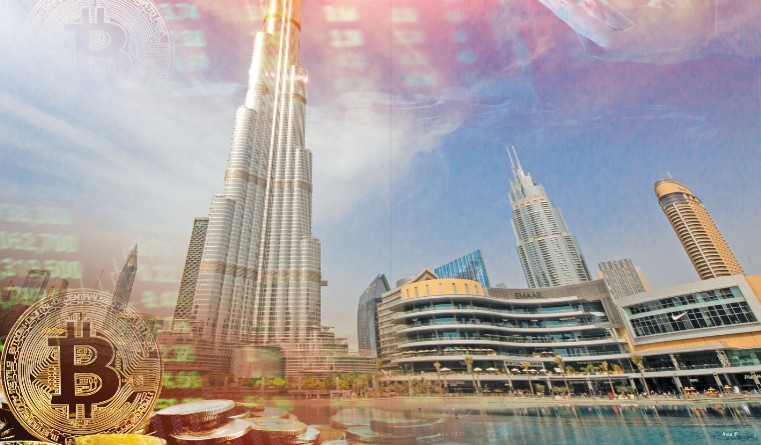Own a slice of a penthouse for US$540: Inside Dubai’s tokenized property boom
21 June 2025

Tokenization is transforming how assets are owned and exchanged in the UAE. Cathy Li explores how the UAE became a hub for digital assets through VARA, breaking down the key challenges, from IP rights to smart contracts and cross-border enforcement.
The ink-stained world of property deeds and bank loans is changing in the Middle East. Now, the Dubai Land Department is cutting bricks into digital shards. Its new platform, Prypco Mint, turns skyscrapers into tokens: buy a fragment of a penthouse for Dh2,000 (US$540). The Middle East’s property market, once ruled by ink and gold, now runs on blockchain – and the gates have just been kicked open.
The Prypco Mint platform, Dubai’s first licensed tokenized real estate investment initiative, was officially launched on May 25, 2025. It was developed by the Dubai Land Department in collaboration with real estate technology firm Prypco, the Virtual Assets Regulatory Authority (VARA), the Central Bank of the United Arab Emirates and the Dubai Future Foundation.
This marks a significant shift in how real estate is bought and sold. Real estate tokenization converts physical property into digital shares, enabling multiple investors to co-own a single asset. Instead of needing to buy an entire unit, investors can purchase fractions, opening the market to those previously priced out of traditional real estate. Initially available only to UAE ID holders, the platform is part of a broader effort to modernize the real estate sector using blockchain technology and is expected to expand globally in future phases.
Beyond real estate, tokenization is also rapidly expanding into creative industries. Literary non-fungible tokens (NFTs) enable authors to bypass traditional publishing models and engage directly with readers through platforms like Creatokia, offering perks such as early access to sequels. In the music sector, platforms like Royal, Bolero and JKBX allow fans to purchase fractional shares of songs and albums, giving them the opportunity to earn royalties while reshaping how music rights are owned and monetized. Rights holders can sell portions of their income streams as NFTs, which are tradable on marketplaces like OpenSea, reshaping how music is owned and monetized.
While regulatory frameworks like VARA and the Abu Dhabi Global Market (ADGM) focus on financial compliance, they also intersect with IP law when it comes to protecting the digital infrastructure behind tokenized assets. This includes safeguarding the intellectual property of blockchain protocols, token standards and digital asset platforms.
“Given that blockchain technology affects every industry, it is in the interest of the intellectual property community to explore the implications of blockchain technology on IP and find suitable models for blockchain usage in the IP space,” the World Intellectual Property Organization said in a report.
Regulating digital assets
To structure a tokenized real estate offering in the UAE, stakeholders must navigate between Dubai’s VARA and the ADGM’s more established framework. Recent amendments to VARA’s Category 1 Virtual Asset issuance now include Asset-Referenced Virtual Assets (ARVAs), enabling the tokenization of real-world assets such as real estate. This aligns with a declaration between VARA and the Dubai Land Department supporting real estate tokenization.
The UAE is already home to several large-scale tokenization initiatives. Among them is Mantra, a blockchain platform developed to support the tokenization of real-world assets with features designed to meet regulatory compliance. In January 2025, Mantra signed a US$1 billion partnership with the DAMAC Group, a UAE-based investment conglomerate, to tokenize a range of assets including real estate, hospitality and data centres across the Middle East.
MEX Digital, a subsidiary of MultiBank Group, has secured a Virtual Asset Service Provider licence from Dubai’s VARA, allowing it to operate broker-dealer and exchange services for virtual assets. In May 2025, MultiBank Group, in partnership with blockchain firm Mavryk and Dubai-based real estate developer MAG, announced a US$3 billion agreement to tokenize real estate assets, including high-profile developments such as The Ritz-Carlton Residences and Keturah Reserve.
“The UAE has not waited for the U.S. regulators to take a more progressive approach to digital assets to regulate and recognize these,” said Mazen Boustany, a partner at Baker McKenzie in Dubai.
Boustany emphasized that the UAE’s regulatory stance is not a lax one but rather a firm framework focused on investor protection, with a strong emphasis on anti-money laundering and counter-terrorism financing. He added that virtual or digital assets are not intended to circumvent any criminal laws.
The United Arab Emirates, particularly Dubai and Abu Dhabi, has emerged as a leading hub for digital assets and tokenization, driven by progressive and distinct regulatory frameworks. Dubai’s VARA and the Financial Services Regulatory Authority (FSRA) of the ADGM are at the forefront of this transformation, establishing comprehensive guidelines that aim to balance innovation with investor protection.
VARA’s gold standard
In recent years, the global crypto industry has faced increasing challenges, particularly in the United States. Crypto conglomerate Digital Currency Group, a U.S.-based venture capital firm that backs major players in the digital asset space, reported a loss of US$1.1 billion in 2022 amid a sharp downturn in the cryptocurrency market.
The Securities and Exchange Commission (SEC) ramped up enforcement, issuing over US$8 billion in fines in 2024 alone. High-profile cases, such as Terraform Labs’ US$4.5 billion settlement, signalled a more aggressive regulatory posture. This created a climate of fear and uncertainty, prompting many crypto firms to seek jurisdictions with clearer, more supportive frameworks.
VARA was introduced by in early 2022 to address emerging risks in the digital asset space. Just months later, the crypto market crash – marked by the collapse of major platforms like Terra and FTX – triggered a global regulatory push for stronger safeguards and left the industry facing uncertainty. As the world’s first independent regulator for virtual assets, VARA introduced a purpose-built, activity-based licensing regime that provided legal clarity and investor protection. Its approach stood in contrast to that of the U.S., where regulatory ambiguity and enforcement-first tactics left many firms in limbo. As a result, Dubai quickly became a global hub for digital assets, attracting major players and fostering innovation in areas like tokenized real estate and blockchain infrastructure.
“If there was going to be such a licensing regime, what would it look like? How would you do it, and how would you go about placing a gold standard?” said Kristi Swartz, a partner at DLA Piper in Hong Kong and key advisor to VARA.
Amid regulatory crackdowns in the U.S. and particularly by the SEC, many crypto firms sought more stable jurisdictions to continue operations. Swartz noted that VARA introduced a timely and well-structured licensing regime, offering a “gold standard” alternative. This proactive approach helped position Dubai as a safe haven for digital asset companies, enabling the crypto industry to survive and grow during a period of global uncertainty.
“I think it was the right place and the right time when VARA put these in place,” Swartz said. She emphasized that while the SEC was “having a go” at companies in the U.S., many were actively seeking “higher ground” – jurisdictions with clearer, more supportive regulatory frameworks. “Otherwise, it probably would’ve wiped out the crypto industry at the time,” Swartz said.
VARA has played a crucial role in helping the crypto industry not just survive but thrive in the UAE, offering tailored licensing for activities such as exchanges, custody and token issuance. In contrast, the FSRA integrates digital assets into its existing financial regulatory framework, aligning with international standards and capital markets laws.
Key challenges in the UAE’s digital asset landscape include harmonizing regulatory approaches across jurisdictions, ensuring compliance with the Financial Action Task Force Travel Rule and addressing the complexities of Shariah-compliant financial structures where applicable.
“It’s very difficult to take somebody completely unregulated into a regulated space,” Swartz said.
Many crypto firms originate in loosely regulated or offshore environments. Transitioning them into a jurisdiction like the UAE, where compliance, licensing and transparency are strictly enforced, requires not just legal adaptation, but often a complete overhaul of business models and governance structures.
“The main difference is that VARA governs activities involving virtual assets directly (emphasizing purpose-built regulation), whereas FSRA adapts existing financial regulations to encompass digital assets, making it a more traditional financial regulator with digital asset add-ons,” said Jorge Carrasco, the Dubai-based managing director and lead for the blockchain and digital assets practice at FTI Consulting, a global firm for organizations facing crisis and transformation.
U.S. President Donald Trump has emerged as a strong advocate for digital assets, marking a significant shift from his earlier scepticism. In March 2025, he signed an executive order establishing a Strategic Bitcoin Reserve and a U.S. Digital Asset Stockpile, positioning Bitcoin as a national reserve asset. His administration has also revoked restrictions on crypto investments in retirement accounts, signalling a deregulatory approach.
Trump’s involvement in the crypto space, including the launch of a Trump meme coin and support for various altcoins, has further energized the market, though it has also raised ethical concerns. Under his leadership, the U.S. has taken a more relaxed regulatory stance, with the SEC dropping several high-profile enforcement actions, including those against Coinbase and Binance.
The IP challenge of tokenization
As of June 2025, the UAE’s Ministry of Economy – which oversees patent registration – does not offer a dedicated classification for blockchain or cryptocurrency-related inventions. However, such technologies may still be patented under existing categories if they meet the standard criteria of novelty, inventive step and industrial applicability. While the ADGM and its FSRA actively support blockchain innovation through regulatory sandboxes, patent approvals remain under federal jurisdiction.
As tokenization transforms how assets are owned and exchanged, it also introduces complex IP challenges that current legal frameworks are still adapting to. Tokenization can streamline IP rights transfers by automating licensing and ownership through smart contracts, reducing reliance on intermediaries and lowering legal costs. These contracts can embed terms directly into code, minimizing the need for lengthy negotiations.
However, smart contracts themselves raise new legal questions. While the code may be protected by copyright, its functionality could qualify for patent protection – if it meets the necessary legal standards. Yet, many jurisdictions, including the UAE, have not fully defined how such digital instruments should be classified or enforced, especially in cross-border contexts.
Legal experts caution that owning a token does not automatically grant IP rights unless explicitly stated. Rights such as reproduction, display or commercialization must be clearly defined in the smart contract or accompanying documentation. As tokenization evolves, clearer legal frameworks and international coordination will be essential for enforceability and investor protection.
Fractional ownership of real-world assets adds another layer of complexity. For example, when a building is tokenized into thousands of shares, questions arise about how architectural copyrights or design patents are managed across multiple owners. While smart contracts can embed licensing terms, enforcement remains ambiguous. Token holders typically do not acquire design rights unless explicitly transferred, and the decentralized nature of blockchain complicates traditional IP enforcement.
Tokenizing IP means turning IP rights, like copyrights or patents into digital tokens on a blockchain. This makes it easier and cheaper to manage and transfer ownership. While the idea is promising, it still faces legal, regulatory and technical challenges. Solving these issues could change how IP is handled and traded across many industries. As the UAE refines its frameworks, tokenization could soon redefine ownership far beyond property.






